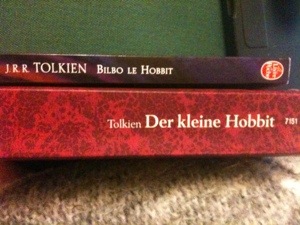Picking up again in Chapter 6 of The Hobbit, Gandalf is finishing up cluing in Bilbo on what happened while he was playing at riddles!
General notes:
Goodness, a book released today couldn’t get away with so much telling of action that the protagonist happened to miss, I must say! Much argument could be had on either side as to whether this is actually a good thing–but to be sure, it’s in keeping with the more relaxed pace of this story, as well as Tolkien’s overall style.
French notes:
First translation shift I note in this round is that in the English edition, Gandalf describes his situation of getting into the caves as “touch and go”. The French translation renders this as “une affaire très incertaine !”
Oh hey, here’s a bit that pings one of my SuperMemo vocabulary verbs: “vous vous le rappeler sans doute”. The actual English text says “as you remember”, and it’s in the bit where the narrator is reminding the reader of Gandalf’s skill with fireworks at the solstice celebrations of the Old Took. Google Translate translates the French phrase as “you probably recall”. And it pinged off of me because I was just this morning reviewing “se rappeler” as a verb, i.e., to remember/recall. The “se” bit changes appropriately to reflect the subject of the sentence, so in this case it’s pinging off of “vous”, the reader.
Here’s another good verb: “falloir”. The English text says “it took a wizard to keep his head in the tunnels and guide them in the right direction”. In French, it’s “il fallait un magicien pour garder la tête claire dans les tunnels et les guider dans la bonne direction”. “Fallait” is the conjugation I’m interested in here, because 1) it’s imperfect tense, and 2) falloir is what is apparently called an impersonal verb. So it only gets conjugated in third person, singular, indefinite! I’m going to have to keep an eye out for this one in SuperMemo. I’m sure I’ll see it sooner or later.
Ooh, here’s another verb I know from songs–gémit, appearing in this sentence: « Mais j’ai horriblement faim », gémit Bilbo. Gémir means “moan/groan”, and it’s all over the lyrics to the awesome La Volée d’Castors song “Belle embarquez”! I am deeply unsurprised to see this word showing up in the context of Bilbo bitching about how hungry he is!
“Une horrible confusion”–this is an instance of how sometimes French words do look pretty much like the English ones, except for being pronounced differently!
This post’s most awesome gigantic French word award must go to “s’épaississaient”! Spotted in the phrase “Déjà les ombres s’épaississaient sur elles”, or “Already the shadows were deepening around them” as in the original English. That big ol’ word comes from the verb “épaissir”, and it’s imperfect tense, third person, specifically. I’m slowly getting the hanging of thinking “ongoing action” when it comes to the imperfect tense.
German notes:
This post’s award for Most Awesome Gigantic German word goes to “Mittsommergesellschaften”!
“Jetzt müssen wir weiter” is the translation provided in German for Gandalf telling everyone “Let’s get on!” Google Translate claims this comes out to “now we must continue”. I keep thinking from the rhythm of the words that I might have heard something that sounds like this before, maybe a fragment of the (admittedly badly pronounced, but hey) German in Raiders of the Lost Ark. I will have to doublecheck this!
Here’s another awesome German word: “Überbleibsel”! It means “remnant” and appears in the context of the party scrambling down the rocks that are a remnant of a landslide. But I swear, it sounds like it ought to be some sort of futuristic flying car or something!
This word, on the other hand, looks like it ought to be Japanese: “Tohuwabohu”! It means “chaos”. SWEET.
That’s it for this post, but before I go, let me share with you my amusement at the comparative thicknesses of the French and German editions of the book. The French version, as you can see, is a much slimmer volume. The German is of course written in German, so naturally one could joke about all the words being longer–but more relevant is that the German text is in a significantly larger point size!
Here’s a photo to show you the difference in book thickness!

Next time: dwarves and a hobbit! In trees! That are on FIRE!
ETA 10/2/2012: A few German speakers have advised me that ‘Tohuwabohu’ is in common enough use in the German language that they don’t think of it as anything but a German word. So it looks like it must have become a loan word, jumping from Hebrew over to German. Learning about this kind of thing, folks, is exactly why I’m enjoying going through the translated versions of The Hobbit so much! Vielen Dank to the German speakers who have enlightened me!
